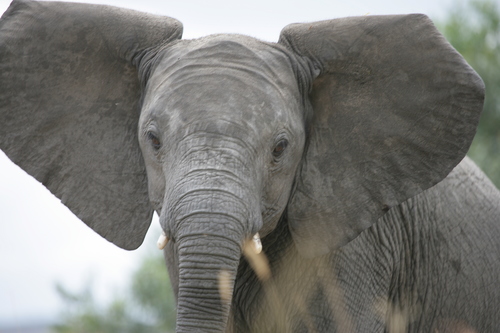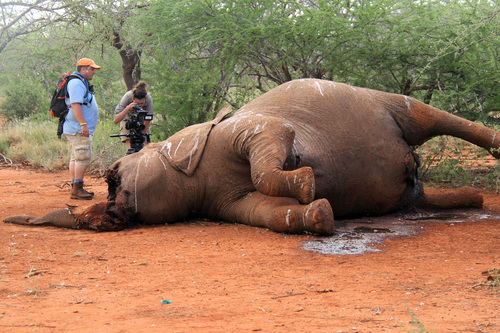The number of elephants in the African savanna is in drastic decline, their population having dwindled by 30 percent between 2007 and 2014, according to the Great Elephant Census, the first-ever pan-African survey of savanna elephants. The report was funded by philanthropist (and HSUS supporter) Paul G. Allen.

Between 2007 and 2014, the number of elephants in the African savanna dropped by a startling 144,000. Photo by Great Elephant Census
This extraordinarily detailed and comprehensive effort, which required the participation of 90 scientists doing on-the-ground work in 18 countries, paints a deeply disturbing picture for the future of this iconic species. Between 2007 and 2014, the number of elephants dropped by a startling 144,000. Continent-wide elephant populations are shrinking by eight percent each year. Some of the worst declines are in Angola, Mozambique, and Tanzania. In certain parts of Cameroon and Zambia, elephant populations could be facing local extirpation. In Zimbabwe’s Sebungwe region — on the Zambezi River and Lake Kariba north of Hwange National Park — populations are down by a sickening 74 percent.
The cruelty that is associated with the decline is soul-numbing. Mike Chase, the scientist who led the survey, told CNN that in just two days, his team counted the remains of more than 20 elephants in a small area in Botswana. In one case, poachers had hacked off the face of a bull elephant in his prime.
The survey results were released just ahead of two international forums where the stakes are high for elephants: the World Conservation Congress, which starts in Hawaii this week, and the United Nations Convention on International Trade in Endangered Species (CITES), which is scheduled to take place in a few weeks in South Africa. Delegates at WCC and CITES will vote on a variety of elephant protection measures, including resolutions on the closure of domestic ivory markets. CITES member countries will also debate a proposal submitted by the African Elephant Coalition (AEC) to uplist all African elephant populations to CITES Appendix I, essentially affording the species the highest level of international protection possible.
Many might think that these measures should pass easily, given the dire plight of the African elephant, but it has been an uphill battle. Pro-trade countries in southern Africa, the conservation organization World Wildlife Fund (WWF), and the European Union have opposed these measures for a variety of reasons. An op-ed in The Guardian by the WWF last month titled “The EU is right to oppose a global ivory ban” baffles many in the conservation community and provides ammunition for pro-trade interests.
These pro-trade groups argue that some African elephant populations in southern Africa do not meet the criteria for Appendix I. They ignore the fact that many of the elephant populations in southern Africa are experiencing severe population declines, including in Angola and Mozambique. The Great Elephant Census results confirm a continent-wide population decline and reinforce the urgent need to include all African elephants on CITES Appendix I to eliminate any potential to reopen the international commercial ivory trade. The HSUS’s global affiliate, Humane Society International, will be at the meetings working hard to defeat any pro-trade measures and assist the 29 member states of the AEC in their campaign to secure passage of elephant protection proposals and resolutions.
Mike Chase, the scientist who led the survey, told CNN that in just two days, his team counted the remains of more than 20 elephants in a small area in Botswana. In one case, poachers had hacked off the face of a bull elephant in his prime. Photo by Great Elephant Census
There is also much we can do here in the United States to shut down the destructive trade in ivory and other imperiled species products. The HSUS is backing a ballot measure in Oregon, YES on 100, that would prohibit the sales of 12 iconic and imperiled animals, including elephants, sea turtles, and leopards. Paul Allen has endorsed YES on 100, which has provisions closely aligned with a successful ballot measure that he and his Vulcan Foundation championed in Washington state last year. While the federal government recently implemented new regulatory changes to restrict the ivory market in the United States, state measures are a critical tool to complement the federal enforcement effort and close any gaps that the federal statutes cannot address. YES on 100 would ensure that Oregon does not provide a marketplace for ivory and other endangered species goods, and eliminate incentives for wildlife smuggling. If YES on 100 passes, Oregon would be on track to join other west coast states, including California, Washington, and Hawaii, in the broader effort to shut down the trade in endangered and threatened species products.
The Great Elephant Census makes it hard to remain optimistic about the survival of this majestic species. But the news should only cause us to put our shoulder to the problem in a more concerted way, since the very existence of the species is at stake. The research results are a blaring siren for all of us to see and hear, and to rush to help the emergency personnel already deploying to help the elephants.
While the news on the ground for elephants is more than discomfiting, let’s remember that we’ve seen good actions during the last two years, both from states and from numerous countries, including the United States, China, and France, that have taken steps to close their domestic ivory markets. Increasingly, stakeholders realize that elephants provide economic benefits through eco-tourism ventures for local communities. We must do all that we can to guarantee the survival of the largest land mammal and the icon of Africa’s natural heritage. Thanks to Paul Allen for bringing clarity to the challenge, and for reminding us of the stakes.
The post Mammoth news about elephants and their status appeared first on A Humane Nation.
Enviroshop is maintained by dedicated NetSys Interactive Inc. owners & employees who generously contribute their time to maintenance & editing, web design, custom programming, & website hosting for Enviroshop.


